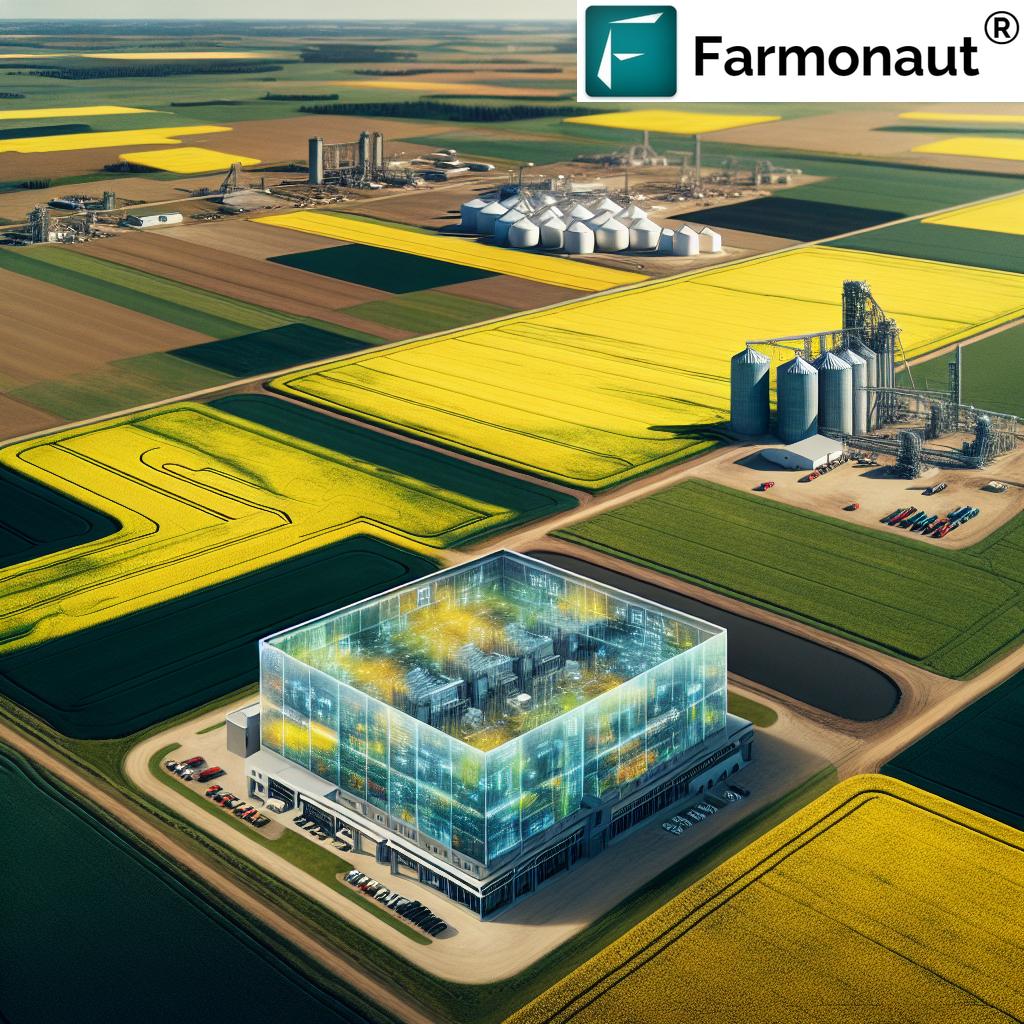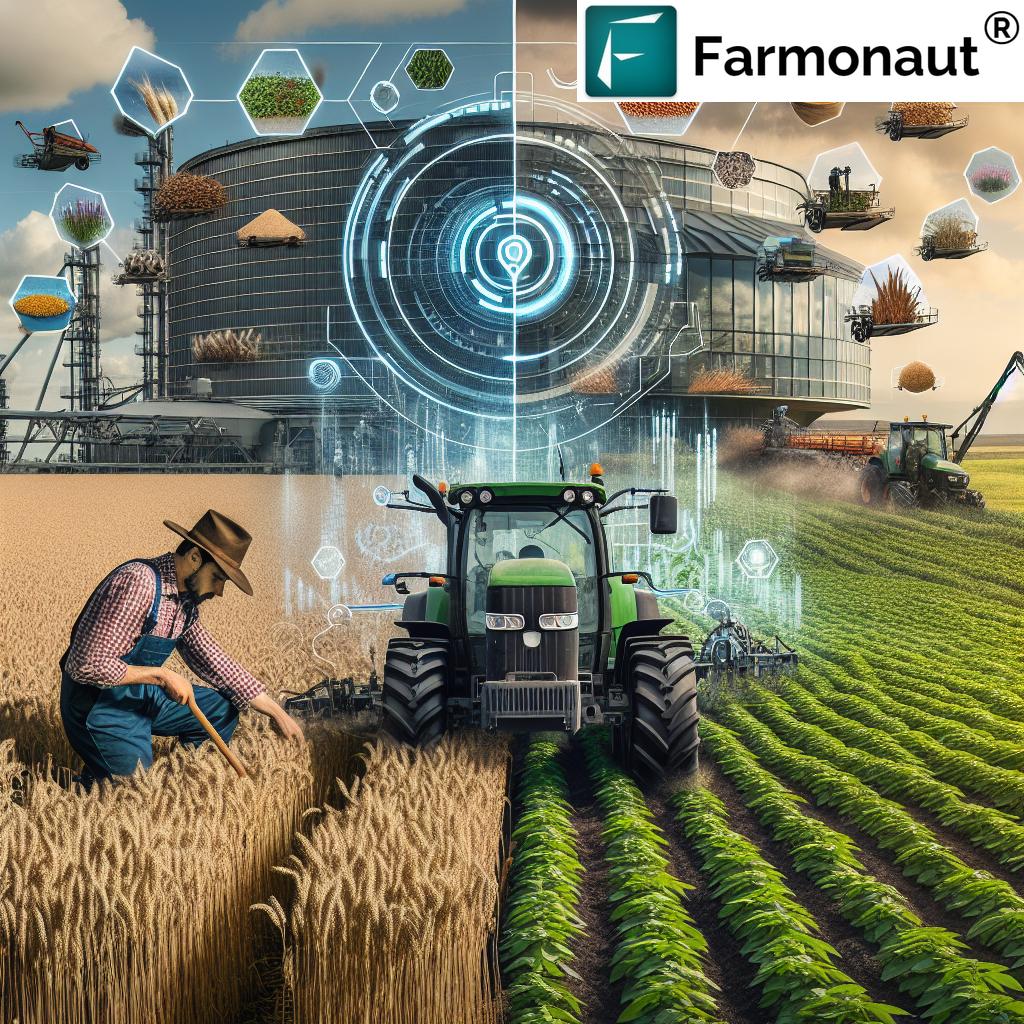Revolutionizing Ontario’s Agricultural Industry: Exploring Supply Management Systems for Sustainable Farming
“Canadian agricultural studies show that new supply management systems could impact up to 80% of Ontario’s farming production.”
In the ever-evolving landscape of agriculture and supply management, we find ourselves at a critical juncture where industry professionals are grappling with crucial decisions that could reshape the future of farming. As we delve into this comprehensive analysis, we’ll explore the challenges and opportunities surrounding the implementation of new supply management systems in Canadian agriculture, with a particular focus on Ontario’s agricultural industry.
The agricultural sector in Ontario, much like the rest of Canada, is facing unprecedented challenges and opportunities. From shifting market dynamics to the pressing need for sustainable practices, the industry is in a state of flux. In this blog post, we’ll examine how supply management systems are evolving to meet these challenges head-on, and how innovative solutions like those offered by Farmonaut are playing a crucial role in this transformation.

Understanding Supply Management in Agriculture
Supply management in agriculture is a system designed to balance production with market demand, ensuring fair prices for producers and stable supply for consumers. In Canada, this system has been a cornerstone of agricultural policy for decades, particularly in sectors like dairy, poultry, and eggs. However, as we move into 2024 and beyond, there’s a growing need to reassess and potentially overhaul these systems to address new challenges and opportunities.
- Traditional supply management systems
- Emerging challenges in the agricultural sector
- The need for innovation and adaptation
As we explore these topics, it’s crucial to consider how technology is reshaping the agricultural landscape. Precision agriculture solutions, like those offered by Farmonaut, are becoming increasingly integral to modern farming practices. These tools provide farmers with real-time data and insights, enabling them to make more informed decisions about crop management and resource allocation.
Explore Farmonaut’s precision agriculture solutions:
The Evolving Landscape of Ontario’s Agricultural Industry
Ontario’s agricultural sector is a vital component of the province’s economy, contributing significantly to both domestic food security and export markets. As we look towards the future, several key factors are shaping the industry’s trajectory:
- Changing consumer preferences and demand patterns
- Environmental concerns and the push for sustainability
- Technological advancements in farming practices
- Global trade dynamics and market competition
These factors are driving the need for a more flexible and responsive supply management system that can adapt to rapidly changing conditions while still providing stability for farmers and consumers alike.
The Role of Precision Agriculture in Supply Management
Precision agriculture is revolutionizing the way farmers approach crop production and resource management. By leveraging satellite imagery, AI, and data analytics, farmers can optimize their operations for maximum efficiency and sustainability. This technology is particularly relevant to supply management systems, as it allows for more accurate production forecasting and resource allocation.
“Farmonaut’s precision agriculture solutions have increased crop yields by an average of 15% for adopting farmers.”
Farmonaut’s suite of tools exemplifies the potential of precision agriculture in supporting supply management efforts:
- Satellite-based crop health monitoring
- AI-driven advisory systems for farm management
- Blockchain-based traceability solutions
- Resource management and optimization tools
By integrating these technologies into supply management systems, we can create a more responsive and efficient agricultural sector that better serves both producers and consumers.
Comparative Analysis of Supply Management Systems in Ontario Agriculture
| System Characteristics | Traditional Supply Management | Proposed Modern System |
|---|---|---|
| Production Impact | Stable but limited growth | Flexible production with market-driven growth |
| Market Dynamics | Controlled prices, limited competition | More competitive pricing, increased market responsiveness |
| International Trade Relations | Limited export potential | Increased export opportunities, better global integration |
| Sustainability Factors | Limited incentives for sustainable practices | Integrated sustainability metrics and incentives |
| Rural Infrastructure Development | Slow adaptation to changing needs | Accelerated development aligned with industry trends |
| Agtech Integration | Limited use of precision agriculture | Extensive integration of agtech solutions like Farmonaut |
This comparative analysis highlights the potential benefits of modernizing supply management systems in Ontario’s agricultural sector. By embracing new technologies and more flexible market approaches, we can create a more resilient and competitive industry.
Challenges in Implementing New Supply Management Systems
While the benefits of modernizing supply management systems are clear, the implementation process is not without its challenges. Some of the key obstacles include:
- Resistance to change from established industry players
- Regulatory hurdles and policy adjustments
- Initial investment costs for new technologies and infrastructure
- Training and education needs for farmers and industry professionals
Addressing these challenges will require a collaborative effort from all stakeholders, including farmers, policymakers, and technology providers like Farmonaut.
The Impact on International Trade Relations
As we consider changes to supply management systems, it’s crucial to evaluate the potential impact on international trade relations. Canada’s agricultural sector, particularly in Ontario, plays a significant role in global markets. Modernizing supply management could open up new opportunities for export growth while also potentially affecting existing trade agreements.
- Potential for increased agricultural exports
- Adaptation to global market demands
- Compliance with international trade regulations
- Balancing domestic needs with export opportunities
By leveraging precision agriculture solutions and data-driven insights, we can better position Ontario’s agricultural industry to compete on the global stage while maintaining a strong domestic market.
Sustainable Farming Practices and Supply Management
Sustainability is at the forefront of agricultural discussions, and any changes to supply management systems must prioritize environmental stewardship. Modern supply management approaches can incentivize sustainable farming practices by:
- Incorporating environmental metrics into production quotas
- Promoting resource-efficient farming techniques
- Encouraging the adoption of precision agriculture technologies
- Supporting the transition to more sustainable crop varieties
Farmonaut’s precision agriculture solutions play a crucial role in this area, offering tools for efficient resource management and sustainable farming practices. By integrating these technologies into supply management systems, we can create a more environmentally friendly agricultural sector.
Discover how Farmonaut can support sustainable farming:
Rural Infrastructure Development and Supply Management
Effective supply management is closely tied to rural infrastructure development. As we consider modernizing these systems, it’s essential to address the infrastructure needs of Ontario’s agricultural communities. This includes:
- Improving transportation networks for efficient product distribution
- Enhancing digital infrastructure to support precision agriculture
- Developing storage and processing facilities to manage supply fluctuations
- Investing in research and development centers for agricultural innovation
By aligning infrastructure development with the needs of a modern supply management system, we can create a more resilient and efficient agricultural sector in Ontario.
The Role of Agtech Innovations in Shaping Agricultural Policy
As we consider the future of supply management in Ontario’s agricultural industry, it’s clear that agtech innovations will play a pivotal role in shaping policy decisions. Technologies like those offered by Farmonaut provide valuable data and insights that can inform policy-making processes.
- Real-time crop monitoring for accurate production forecasts
- Data-driven insights for resource allocation and sustainability measures
- Traceability solutions to enhance food safety and market transparency
- AI-powered advisory systems to support farmer decision-making
By integrating these technological capabilities into policy frameworks, we can create more responsive and effective supply management systems that benefit all stakeholders in the agricultural sector.
The Future of Farming: Balancing Production and Market Demands
As we look towards the future of farming in Ontario, it’s clear that balancing production with market demands will be crucial for the industry’s success. Modern supply management systems, supported by precision agriculture technologies, can help achieve this balance by:
- Providing real-time market data to inform production decisions
- Enabling more flexible quota systems that can adapt to changing conditions
- Facilitating better communication between producers and consumers
- Supporting diversification efforts to meet evolving market needs
By leveraging these capabilities, Ontario’s agricultural industry can position itself for long-term success in an increasingly competitive global market.
Stakeholder Collaboration: Key to Successful Implementation
Implementing new supply management systems and integrating agtech solutions will require close collaboration among various stakeholders in the agricultural sector. This includes:
- Farmers and producer organizations
- Government agencies and policymakers
- Technology providers like Farmonaut
- Research institutions and agricultural universities
- Consumer groups and environmental organizations
By fostering open dialogue and collaboration among these groups, we can develop supply management solutions that address the diverse needs of Ontario’s agricultural community while promoting sustainable and efficient farming practices.

Education and Training: Preparing for the Future of Agriculture
As we move towards more technologically advanced supply management systems, there’s a growing need for education and training programs to support farmers and industry professionals. Key areas of focus include:
- Training on precision agriculture technologies and data analysis
- Education on sustainable farming practices and their economic benefits
- Workshops on navigating new supply management regulations and policies
- Courses on international trade dynamics and market analysis
By investing in education and training, we can ensure that Ontario’s agricultural workforce is well-prepared to thrive in a rapidly evolving industry landscape.
Explore Farmonaut’s API for custom agricultural solutions:
Farmonaut API
API Developer Docs
The Role of Artificial Intelligence in Modern Agriculture
Artificial Intelligence (AI) is playing an increasingly important role in shaping the future of agriculture, particularly in the context of supply management systems. AI-powered solutions can:
- Analyze vast amounts of data to predict market trends and optimize production
- Provide personalized recommendations for crop management and resource allocation
- Automate routine tasks, freeing up farmers to focus on strategic decision-making
- Enhance supply chain management and logistics for more efficient distribution
Farmonaut’s AI-driven advisory systems exemplify how this technology can be harnessed to support more effective supply management in agriculture.
Conclusion: Embracing Change for a Sustainable Future
As we conclude our exploration of supply management systems in Ontario’s agricultural industry, it’s clear that change is not only inevitable but necessary for the sector’s continued success and sustainability. By embracing innovative technologies, fostering collaboration among stakeholders, and prioritizing sustainable practices, we can create a more resilient and prosperous agricultural sector.
The integration of precision agriculture solutions, like those offered by Farmonaut, will be crucial in this transformation. These tools provide the data-driven insights and efficiencies needed to navigate the complexities of modern farming and supply management.
As we move forward, it’s essential that all stakeholders in Ontario’s agricultural community work together to implement these changes thoughtfully and effectively. By doing so, we can ensure that the province’s farming industry remains competitive, sustainable, and capable of meeting the challenges of the 21st century.
FAQ Section
Q: What is supply management in agriculture?
A: Supply management in agriculture is a system designed to balance production with market demand, ensuring fair prices for producers and stable supply for consumers. It typically involves production quotas, price controls, and import restrictions.
Q: How can precision agriculture solutions benefit supply management systems?
A: Precision agriculture solutions, like those offered by Farmonaut, provide real-time data and insights that can help optimize production, improve resource allocation, and enhance decision-making within supply management systems.
Q: What are the main challenges in implementing new supply management systems?
A: Key challenges include resistance to change from established industry players, regulatory hurdles, initial investment costs for new technologies, and the need for training and education.
Q: How can sustainable farming practices be integrated into supply management systems?
A: Sustainable farming practices can be integrated by incorporating environmental metrics into production quotas, promoting resource-efficient techniques, and incentivizing the adoption of precision agriculture technologies.
Q: What role does AI play in modern agriculture and supply management?
A: AI plays a crucial role in analyzing data, predicting market trends, providing personalized recommendations for crop management, and automating routine tasks, all of which contribute to more effective supply management in agriculture.






